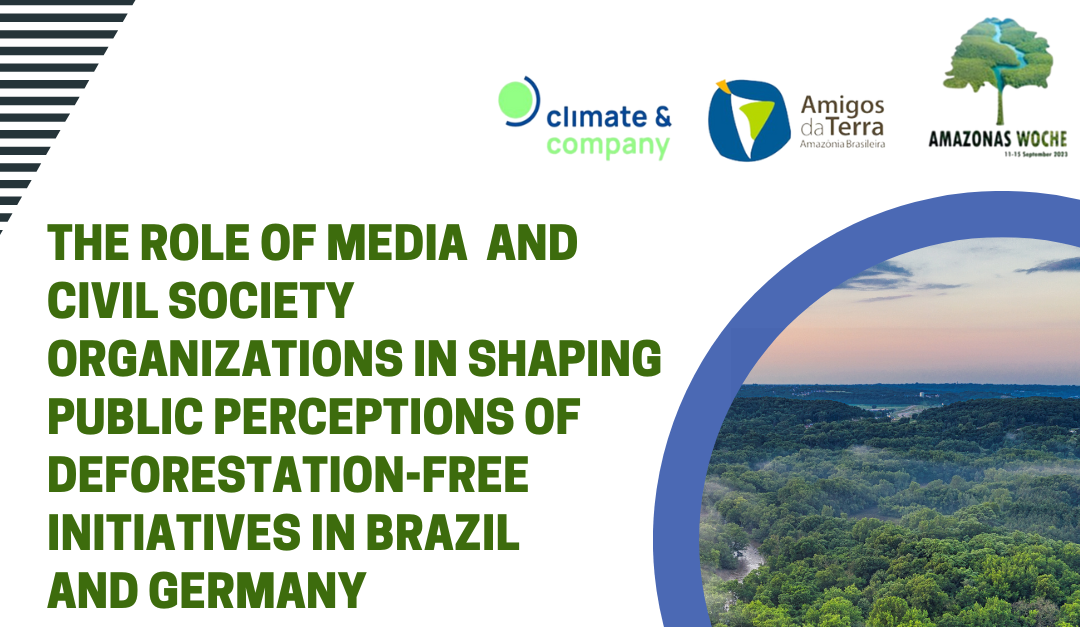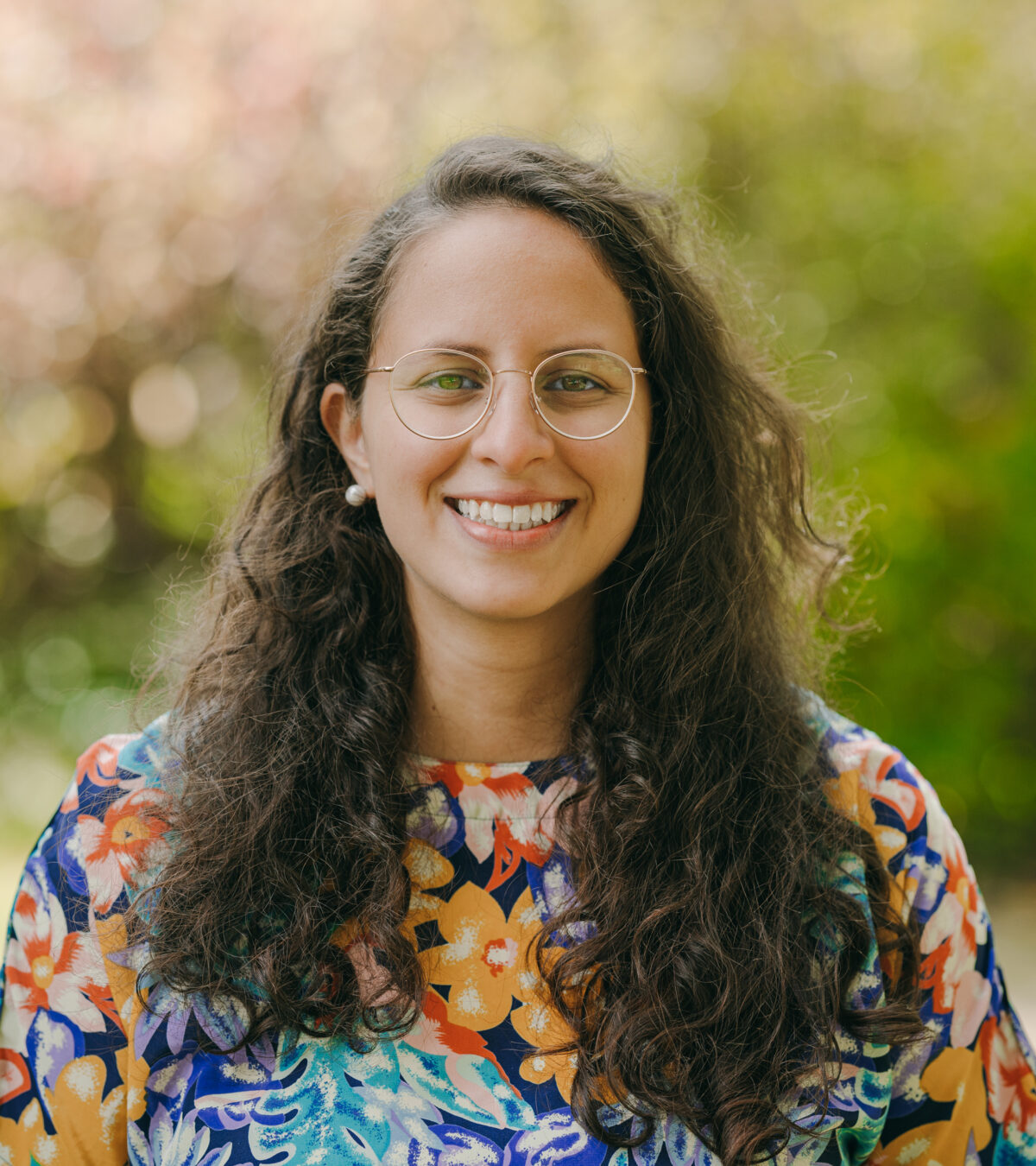
Webinar Recap: The role of media and Civil Society Organisations in shaping public perceptions of deforestation-free initiatives in Brazil and Germany
September 25, 2023
What is the role of media in shaping public perceptions of deforestation? This was the leading questions of this webinar we hosted in collaboration with the NGO Amigos da Terra – Amazônia Brasileira and the support of BRASFI – the Brazilian Alliance for Sustainable Finance and Investments during the “Amazonas Woche” organised by the Embassy of Brazil in Berlin. Here you can find a recap of the event on media coverage of deforestation if you have missed it or want to refreshen your memory.
This webinar was held on 14th September. It aimed to promote a discussion on the role media coverage of deforestation plays in shaping public perceptions of deforestation-free initiatives in Brazil and Germany. Different policies and strategic frameworks to reduce deforestation have been recently developed in Brazil, the EU, and worldwide. How these initiatives are portrayed in the media of the respective other countries plays a crucial role in the successful implementation of these different policies.
The following speakers were present to give their views:
- Daniela Chiaretti – Journalist, Valor Econômico S/A , Brazil
- Susanne Bergius – Journalist, Germany
- Mauro Armelin, – NGO Amigos da Terra – Amazônia Brasileira
- Nicole Polsterer – Fern NGO
- Javier Ortiz Bahamón – Tropical Forest Alliance
The panel was moderated by Catharina Vale, senior external advisor at Climate & Company.
The 5th of September is dedicated to celebrating the largest tropical forest on the planet, the Amazon Rainforest. Therefore, the Embassy of Brazil in Berlin organised a series of events: The “Amazonas Woche” took place from the 11th to the 15th. The events aim to promote discussion on the sustainable development of the Amazon region. Furthermore, they foster the dialogue between stakeholders in Brazil and Germany. See the programme here.
These are our 7 key takeaways on ‘the Role of Media and Civil Society Organisations in shaping Public Perceptions of Deforestation-free Initiatives in Brazil and Germany’:
- The economic risks associated with deforestation and the loss of biodiversity should be more explored by media in the economic and financial news sections;
- Brazil is politically divided and that effects news perception by general public;
- Fake news is a contemporary problem that impacts the media coverage of deforestation, and communication is key to tackle fake news;
- Media frequently fails to delve into the underlying systemic causes essential for a holistic approach to combating deforestation;
- There are still doubts about the EUDR implementation, mainly on how small producers are affected which need to be addressed by media actors for Brazil to welcome the EUDR;
- NGOs play an important role in building bridges between the communities and providing reliable data;
- Media should be more creative to break the complexity inherent to the topic of covering deforestation and the EUDR to reach society in general
Question 1: How has Brazil been portrayed in the media concerning deforestation?
The EU specialist’s perspective:
Media reporting on deforestation in Latin America is robust and has shown significant improvement over the last 15 years. However, it is now characterised by fragmentation, which can lead to confusion. While reporting on Brazil and deforestation from an international perspective, a significant part of this coverage focuses on Brazil (which holds 60% of the Amazon), and other countries in the Amazon basin and other Brazilian biomes are not well covered. There is a lack of in-depth analysis and detailed information in media reports. While the causes of deforestation are discussed, the media often falls short of addressing the systemic root causes needed for a comprehensive approach to combating deforestation. In reference to the EUDR, it is observed critical responses from Brazil concerning EU unilateralism, as well as alarmist narratives from companies and stakeholders, which create a critical image for both sides.
The Brazilian specialist’s perspective:
In the last four years, there has been a political orientation toward deforestation as a growth promoter, and this understanding is a major problem Brazil is still facing. Although deforestation in the Amazon has been reduced under the current government, there is still a lot of action needed. Some people believe that the deforestation issue has already been solved, which is not true. Media plays an important role in educating the public about the long-term impacts of deforestation, including its effects on rainfall, and water resources, and its potential consequences for Brazilian agriculture.
The journalists’ perspective:
In the EU and Germany, climate journalists have increasingly covered deforestation, but usually on environmental and mixed entertainment pages, with less coverage in the politics and economy departments of media. The connection between biodiversity crises and the importance of forests in the Amazon/Cerrado and other biomes in the world is not well explained. Financial and economic journalists normally do not report the relevance of these biomes for trade, or financial institutions. It is observed in the media in the EU and Germany that Brazil is polarised, divided into two political blocks, with very different opinions on deforestation, nature, and the role that companies and businesses play in it.
In Brazil, there was a notable shift in Amazon coverage during the former presidency. Traditional and alternative media outlets dedicated to socio-environmental issues started reporting Amazon deforestation using official data, releasing weekly updates on the issue. The rise in deforestation rates raised concerns among citizens, mainly in the South and Southeast regions, in a movement that was not expected. Due to the right deforestation rates, the Amazon region assumed a political role it had not previously occupied. Brazil’s reputation has been tarnished, which has created huge sensitivity in the economy. An international movement was observed, mainly in the UK and the EU, where retailers and customers said they would not buy products linked to deforestation.
Question 2: How can civil society contribute to improving coverage of deforestation in the media?
The journalists’ perspective
There is a lot of misinformation, mainly regarding the Amazon Rainforest. The rainforest is huge and very diverse and most journalists and the society have never been there. When considering the EUDR, we need to understand better this regulation and how small producers are affected. In this sense, NGOs can play a vital role in clarifying how its implementation may or may not have adverse social effects in Brazil.
A recent statement from Itamaraty (Brazilian Ministry of Foreign Affairs) signed by 17 countries, expressed their concerns regarding the EUDR. NGOs should make clear the dependence of worlds’ economy on nature and biodiversity, as political, economic, and financial journalists should explore this topic. The world developed due to the forest, however there is no economic model to live with standing forests. NGOs and institutes are needed to support Brazil to develop with the Amazon and end poverty and inequality.
The Brazilian experts’ perspective:
Specialists need to stop talking to themselves and communicate appropriately. Often, they do not speak in public, and the media should translate numbers and technical terms to a wider audience. There is a need to educate the consumers to perceive product attributes and empower them to demand products free of deforestation, i.e : consumer power translated into action.
The EU specialist’s perspective:
It’s crucial for individuals, including indigenous peoples and farmers that their voices are heard. It is also vital that they are able to represent themselves. Media plays a vital role in humanising their stories, depicting their challenges and potential solutions. While NGOs face numerous demands, they cannot make happen change on their own. NGOs can support by speaking with the people on the ground giving access to these voices, building bridges and can help by providing data.
NGOs should develop and bring to the discussion an economic development model. The global community, in general, appears to lack the deep concern and awareness required to initiate fundamental shifts in our consumerism and economic framework. However, there is not enough funding to really look into these issues in depth.
Question 3: What could be done to improve the understanding of the EUDR and other similar legislation?
The EU specialist’s perspective:
If we want to change public perception of deforestation, media and civil society have to be much more creative. This entails for example a) using voices of people that really get to the heart of people and b) reducing the complexity of data. This could happen for instance, by using the voices of musicians and artists to translate science in a way that is more intelligible. To consolidate change, a bottom-up approach is very helpful. The EUDR is a huge opportunity for Brazilians to be ahead of competitors and the media should explore it. Another important point to be covered by the media is that the EU is not the only trading block to develop such legislation because the trend for sustainable products is definitely there globally.
The journalists’ perspective:
There are still many doubts about the EUDR in Brazil, highlighting the pressing need for more comprehensive information. The EUDR is a systemic approach, and it is important to reach out not only to the stakeholders and producers but also to decision-makers and consumers. There is a need to comprehend benefits for those farmers/producers which do its best for sustainability, as now, doing what is wrong is cheaper and easier. There is a need to support and cooperate with smallholder farmers to comply with the EUDR, and for training exporters and buyers about the EUDR.
More information and our webinar on Promoting Sustainable Beef Supply Chains:
This webinar on the role of media in shaping public perceptions of deforestation was not recorded. If you have any questions or suggestions regarding these topics, feel free to reach out to us! We would love to get in touch.
Our team also organised a second webinar on the promotion of a sustainable beef supply chains. You can find the event recap here. Both events were organised as part of a project financed by the Betty and Gordon Moore Foundation. By engaging experts from both Brazil and Germany, these webinars facilitated meaningful bilateral discussions and exchange of ideas related to the promotion of a sustainable beef supply chain (panel 1) and the key role played by the media in shaping public perception of deforestation (panel 2).
